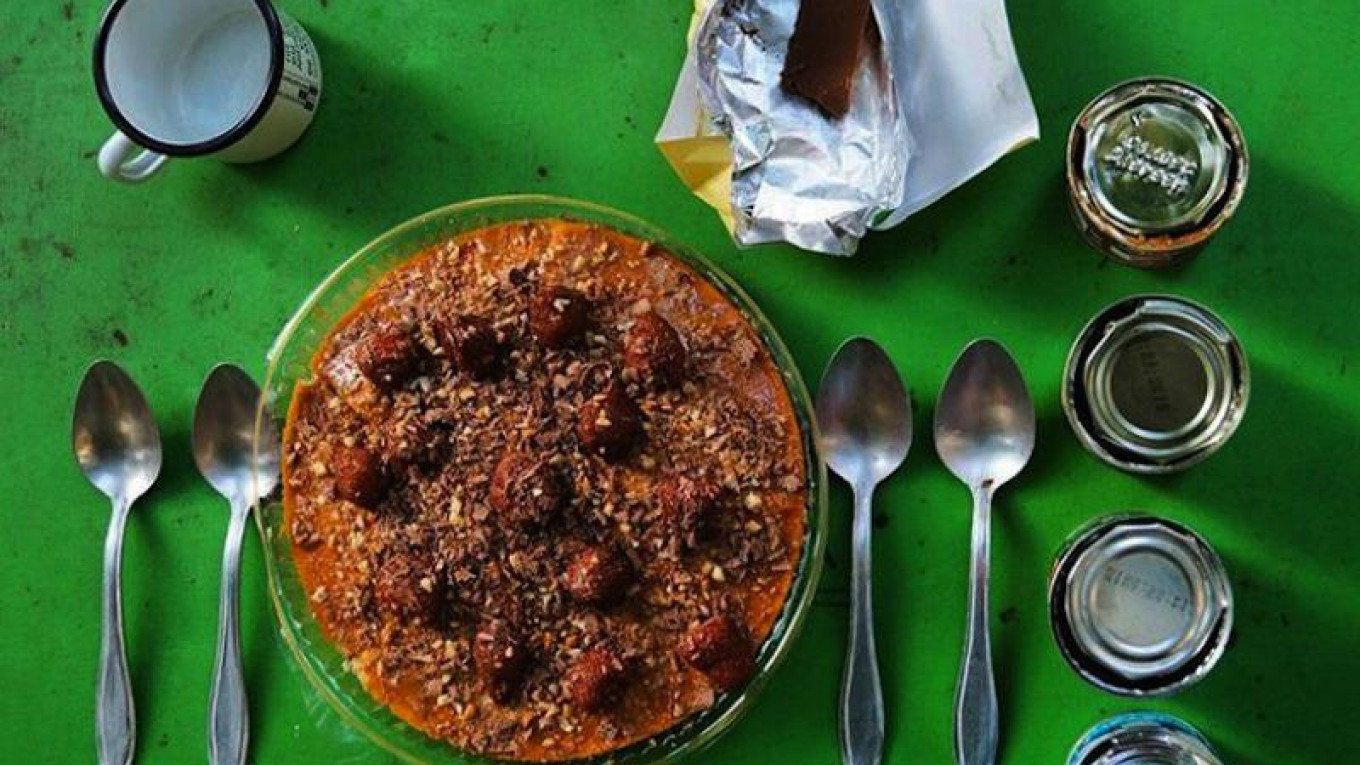Andrei Barabanov spent almost four years in prison — plenty of time to get familiar with the menu, you would think.
Barabanov was among the tens of thousands of Russians who gathered on Bolotnaya Ploshchad on May 6 2012 to protest mass electoral fraud on the eve of Vladimir Putin's third presidency.
Like dozens of other protesters, he was detained and later harshly sentenced on charges of “participating in a mass riot” and “using violence against the police.” The Kremlin’s uncompromising crackdown was repeatedly denounced by human rights monitors as being politically motivated.
In a month-long campaign for the human rights organization Rus Sidyashchaya, Barabanov reminisces about his time behind bars by publishing a prison recipe on Instagram every day.
Unsurprisingly, the Russian prisoner's diet can hardly be called luxurious. Before he was locked up, Barabanov was already suffering from stomach problems. His time in prison made his physical condition “much worse,” he told The Moscow Times in written comments. Nevertheless, his project is a positive one.
“We wanted to show what prisoners are being fed in canteens,” Barabanov said. “And prove people don't always live under hellish conditions.”
The recipes are inspired by Barabanov's own experience and that of fellow former inmates. There are also plans to collect the recipes into a book once the project finishes, he said.
“My favorites were the fish soup and the bean salad,” he added.
The project is still ongoing. Here's a translation of four of the posts so far:
1. Prisoners’ Nutella
Recipe by Alexander Margolin, Bolotnaya detainee.
Time behind bars: 4 years and 3 months.
Ingredients: 400 grams of “Yubileinoye” digestive cookies or more primitive analogue; 3 teaspoons of cocoa powder; 1 cup of milk; 150 grams of butter; nuts; half a tin of condensed milk.
1. Heat up a bowl by placing in boiling water. Place the butter in the bowl. Be patient. After several minutes the steam bath will turn the butter into a greasy slush.
2. Crush the biscuits and nuts. Add the crumble mix to the greasy slush.
3. Stir carefully.
4. Pour in the hot milk and condensed milk, and then add the cocoa powder.
5. Carefully continue stirring until the mix takes on a pleasant consistency.
6. Leave the container in a cool place.
7. Spread on bread.
2. Happy Holidays
“Festive canape” with moonshine by Andrei Barabanov. Bolotnaya detainee.
Time behind bars: 3 years, 7 months.
“I spent New Year's Eve 2014 at Butyrka prison. We began preparing for it several weeks in advance. We ordered scarce products through relatives, stacked up in the prison shop, and picked out potatoes from canteen dishes, so that we could make Russian salad later. We cleaned out our cell, decorated the place with branches from a Christmas tree, put out postcards everywhere.
Then we gave our neighboring cellmates a pack of sugar and they made moonshine out of it. So we thanked them with cigarettes and sweets. We drank the moonshine together with the canapes, just like you see in the photo. We wanted to feel the typical New Year's spirit, and create a special atmosphere. In prison it's very important to have the possibility of distancing yourself just a little from the surrounding reality.”
3. Cheers!
What you need to make moonshine by Ilya Gushchin, Bolotnaya detainee.
Time behind bars 2 years 6 months.
The objects in this photo are not what they seem.
1. Future valve. Cut the neck of the bottle. It will be used later to remove gases from your moonshine.
2. Multifunctional bags. You can use these to store your homebrew, to cover your moonshine instrument, or as “kontrolki,” i.e. small strings to hold the entire structure in place.
3. A tub. Right now it contains Korean carrot salad, but soon the container will be filled with spirit.
4. Simple sugar. This is the main component of fermentation.
5. Batteries. Hot water will be poured into the bottles, and used to later heat up the brew.
6. Yeast. The bread needs to be sprayed with water, and then left to “flower” for a couple of days. This step is not necessary if you can obtain traditional yeast by illegal means.
7. Boiler. For boiling water. If you don't have one, you can disassemble an electric teapot and extract a heating spiral.
8. A bucket. Useful for mixing components.
9. A basin. This is the core of your moonshine-making apparatus.
4. Rise and Shine
“They didn’t give us porridge in the prison canteen, but an incomprehensible gray mass. Instead of butter, they would use kombizhir [a butter substitute of animal and vegetable fats popular in Soviet times]. I had stomach problems and I felt as if they were trying to kill me.
We were often given chaff porridge — it's made out of a mixture of ground grains of very low quality (before, it was used to feed soldiers.) This porridge was practically tasteless. Prisoners added sweetener to it to somehow improve the taste. After the chaff porridge, you would almost instantly want to eat. It didn't digest well.
So this is why we tried to make our own porridge. On the photograph you can see oatmeal with raisins, condensed milk and milk.
To make the porridge, first pour boiling water over the instant
oatmeal. Then throw the raisins in (or any other dried fruits), cover
with a lid, wait 10-15 minutes. Pour in the milk and the
condensed milk."
You can find more photos and recipes here.
A Message from The Moscow Times:
Dear readers,
We are facing unprecedented challenges. Russia's Prosecutor General's Office has designated The Moscow Times as an "undesirable" organization, criminalizing our work and putting our staff at risk of prosecution. This follows our earlier unjust labeling as a "foreign agent."
These actions are direct attempts to silence independent journalism in Russia. The authorities claim our work "discredits the decisions of the Russian leadership." We see things differently: we strive to provide accurate, unbiased reporting on Russia.
We, the journalists of The Moscow Times, refuse to be silenced. But to continue our work, we need your help.
Your support, no matter how small, makes a world of difference. If you can, please support us monthly starting from just $2. It's quick to set up, and every contribution makes a significant impact.
By supporting The Moscow Times, you're defending open, independent journalism in the face of repression. Thank you for standing with us.
Remind me later.






